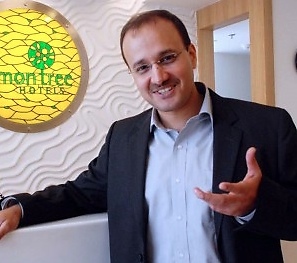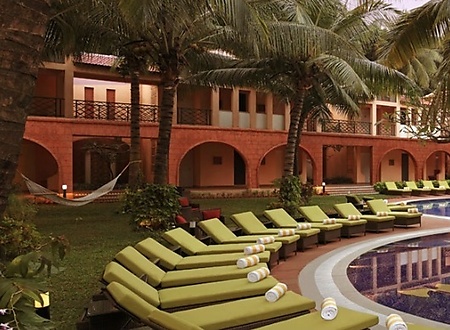Deaf Travel31st August 2014
Setting New Standards in Deaf and Disabled Employment
Taking employment equality seriously, the India based Lemon Tree Hotel chain are an example to the world.

On the world stage, we can come across as being quite superior and highbrow. It all stems back to those pre 1912 ‘Rule Britannia’ days. And yet, despite this, disabled people, Deaf and Hard of Hearing people amongst them, are often treated poorly – socially, recreationally and in the work place. Particularly in the work place!
Unlike some countries, we do have legislation in place to protect disabled people and their right to be treated fairly. Whilst this was met with positive action in respect of physical alterations to buildings, arguably, it has done little to change attitudes and the real life experiences of many disabled people who often have to fight tooth and nail every day to be treated fairly, sensitively and with respect. Still far too few people in the UK see the ability, their focus invariably on the dis(ability) and the subsequent denial of an opportunity.
There can be no greater proof of the stance of deaf and otherwise disabled people in the UK than the current attack on them by the coalition Government. It is an attack that is withdrawing employment support for those that have jobs, is denying support to those who are seeking jobs and is damaging quality of life through welfare changes.
 Against this backdrop, I am always on the look out for good practice and organisations that are stand out in their attitude and support towards disabled people. In India, there is one such business – The Lemon Tree Hotel chain. Founded in 2002, the Lemon Tree Hotel chain now has 25 hotels in 15 cities with three different grades of hotel. They are one of the fastest growing hotel chains in India, with plans to expand to 40,000 hotel rooms in the next 10 years. What makes them stand out, stems from Project Sankalp, which began in 2007. Through that project, visitors to one of the Lemon Tree Hotels might be served in the restaurant by a deaf waiter, booked in by someone who is an amputee, or have their crockery cleared by someone who has Downes Syndrome.
Against this backdrop, I am always on the look out for good practice and organisations that are stand out in their attitude and support towards disabled people. In India, there is one such business – The Lemon Tree Hotel chain. Founded in 2002, the Lemon Tree Hotel chain now has 25 hotels in 15 cities with three different grades of hotel. They are one of the fastest growing hotel chains in India, with plans to expand to 40,000 hotel rooms in the next 10 years. What makes them stand out, stems from Project Sankalp, which began in 2007. Through that project, visitors to one of the Lemon Tree Hotels might be served in the restaurant by a deaf waiter, booked in by someone who is an amputee, or have their crockery cleared by someone who has Downes Syndrome.
 Their employment in the hotel is not typical of the tokenism you might find in some British businesses, with Deaf and Hard of Hearing employers alone, making up 7% of the staff employed by Lemon Tree Hotels. In the near future, the management hope to raise this to 10% of the workforce. When asked to explain why the Lemon Tree chain had started their wide scale recruitment of deaf and disabled employees, Rahul Pandit, President and Executive Director at Lemon Tree Hotels, said, “We wanted to share and give back to society in a meaningful way and promote true inclusiveness.”
Their employment in the hotel is not typical of the tokenism you might find in some British businesses, with Deaf and Hard of Hearing employers alone, making up 7% of the staff employed by Lemon Tree Hotels. In the near future, the management hope to raise this to 10% of the workforce. When asked to explain why the Lemon Tree chain had started their wide scale recruitment of deaf and disabled employees, Rahul Pandit, President and Executive Director at Lemon Tree Hotels, said, “We wanted to share and give back to society in a meaningful way and promote true inclusiveness.”
In the early days of the Project, Rahul and his Executive team faced resistance from within about the capability of disabled staff to perform to the same standards as other staff. Competence was questioned and simply employing disabled people without changing some of the way things were done at the hotel might have hindered or even prevented their success. However, as Rahul explained, “After a year of intense training and service and process redesign, we were successful in delivering equivalent service levels across this integrated workforce.”
 In a staged approach to their wonderful ambitions, the hotel initially employed disabled people in ‘Heart of the House’ jobs, such as in laundry rooms, looking after the gardens and keeping the hotels clean, but this was a stepping stone in the project, which has since trained staff in front of house/customer facing jobs too.
In a staged approach to their wonderful ambitions, the hotel initially employed disabled people in ‘Heart of the House’ jobs, such as in laundry rooms, looking after the gardens and keeping the hotels clean, but this was a stepping stone in the project, which has since trained staff in front of house/customer facing jobs too.
Serious about their long terms plans, the hotel enlisted the help of true experts in their field, not just ‘well meaning’ people who do the talking on behalf of disabled people which you often encounter in the UK, including Arun Rao of the Deaf Way Foundation in India. The experts helped them develop safe work practices, effective communication strategies, knowledge and understanding and good working practices.


This has meant that rather than having a disabled person employed on their own, they tend to work in teams of 8 to 10, which gets rid of the issue of isolation and lack of integration that often exists in the UK and elsewhere. Disabled staff also have promotion opportunities, meaning that many are likely to remain loyal to the Lemon Tree chain and will stay with them for many years to come.
 Don’t just listen to my views on this, this is what the President says, “We are delighted and eager to drive this movement across our three brands in 15 cities and 25 hotels. This demographic has now become an alternate talent pool for the company. In the present times, while there is a struggle to find good people, 21 million disabled people in India have hardly any lifestyle and vocation choices. We are now working towards including socio-economically disadvantaged citizens too, to create a diverse, inclusive culture as we work towards our goal of operating 40,000 rooms over the next 10 years.”
Don’t just listen to my views on this, this is what the President says, “We are delighted and eager to drive this movement across our three brands in 15 cities and 25 hotels. This demographic has now become an alternate talent pool for the company. In the present times, while there is a struggle to find good people, 21 million disabled people in India have hardly any lifestyle and vocation choices. We are now working towards including socio-economically disadvantaged citizens too, to create a diverse, inclusive culture as we work towards our goal of operating 40,000 rooms over the next 10 years.”
 Getting their staff knowledgeable and sensitive to the varying needs of the disabled staff has been one of the greatest challenges since the inception of this programme, but that has now developed to such an extent that managers and department heads have learned Indian Sign Language, a programme that has extended to the Head Office based staff. The impact is such that the Chief Operating Officer commented, “Our meetings will be shorter and more effective if we speak in sign language.”
Getting their staff knowledgeable and sensitive to the varying needs of the disabled staff has been one of the greatest challenges since the inception of this programme, but that has now developed to such an extent that managers and department heads have learned Indian Sign Language, a programme that has extended to the Head Office based staff. The impact is such that the Chief Operating Officer commented, “Our meetings will be shorter and more effective if we speak in sign language.”
 Whilst I applaud the equality stance adopted by the Lemon Tree, it is also important to recognise the real difference their programme will make in Indian Society. This is best explained by Nikhil Sharma, Assistant Vice President, Operations, “It’s an absolute delight to watch them blossom and grow. It is not just a source of employment we are creating in their life, but hopefully changing their whole life. Do you know disabled people die almost 10 years earlier in India than in other countries? It is because they are ostracised socially, lack opportunities and are discriminated against by their closest kith and kin. With an income, they get a sense of pride and accomplishment.”
Whilst I applaud the equality stance adopted by the Lemon Tree, it is also important to recognise the real difference their programme will make in Indian Society. This is best explained by Nikhil Sharma, Assistant Vice President, Operations, “It’s an absolute delight to watch them blossom and grow. It is not just a source of employment we are creating in their life, but hopefully changing their whole life. Do you know disabled people die almost 10 years earlier in India than in other countries? It is because they are ostracised socially, lack opportunities and are discriminated against by their closest kith and kin. With an income, they get a sense of pride and accomplishment.”

I have written many times about ‘attitude’ being the most important quality when dealing with deaf and other disabled people. With the right attitude, people work together towards a common aim and great things can be achieved. When asked about the one quality that underpins Lemon Tree’s recruitment of disabled people, the President responded with one word, “Attitude!” I could not agree more.
 The cynical and discriminatory amongst our readers will be questioning the impact of this stance on the hotel’s bottom line and the quality of the customer experience. A mere 12 years after the company was launched and 7 years into Project Sankalp, it would be ludicrous to think that the President and his executive colleagues would be continuing with this programme if it was damaging the hotel in any way. They have simply found that with thought, consideration and training, deaf and disabled people ‘can do’, even bringing skills and strengths to the work floor, that do not exist in non-inclusive recruitment.
The cynical and discriminatory amongst our readers will be questioning the impact of this stance on the hotel’s bottom line and the quality of the customer experience. A mere 12 years after the company was launched and 7 years into Project Sankalp, it would be ludicrous to think that the President and his executive colleagues would be continuing with this programme if it was damaging the hotel in any way. They have simply found that with thought, consideration and training, deaf and disabled people ‘can do’, even bringing skills and strengths to the work floor, that do not exist in non-inclusive recruitment.

The Lemon Tree Hotel chain have introduced a new way of thinking in the employment of deaf and disabled people. Their programme has been challenging and no-one involved will try and say it has been easy, but then, nothing worth achieving is. In demonstrating the impact this Project has had on the young team of directors at the Lemon Tree, I learned that the group has ambitious plans for a new hotel in Gurgaon which will be staffed almost entirely by disabled staff, making them the first hotel to be staffed by close to 100 per cent of disabled employees.
As for the customers at Lemon Tree Hotels since their employment of deaf and disabled staff, here are a few of the comments from people have stayed at their Premier Hotel at Delhi Airport. According to Trip Advisor, based on 216 reviews, the hotel is rated 21st out of 593 in New Delhi:
“Convenient, comfortable, great customer service.” (2014)
“ I would recommend to stay at this hotel. Value for money and service.” (2014)
“Wow experience.” (2014)
“Truly enjoyable.” (2014)
“The Art of Hospitality.” (2014)

Summing up their mindset to disabled employment, the President said, “We are an equal opportunity employer. All colleagues are treated at par; there is no disparity in salaries.”
We can but hope that UK based businesses and global companies with bases in the UK, learn from the forward thinking, altruistic and equality motivated recruitment and employment ethos that is used by the Lemon Tree Hotel chain.
Article by Sarah Lawrence
posted in Deaf Lifestyle / Deaf Travel
31st August 2014





